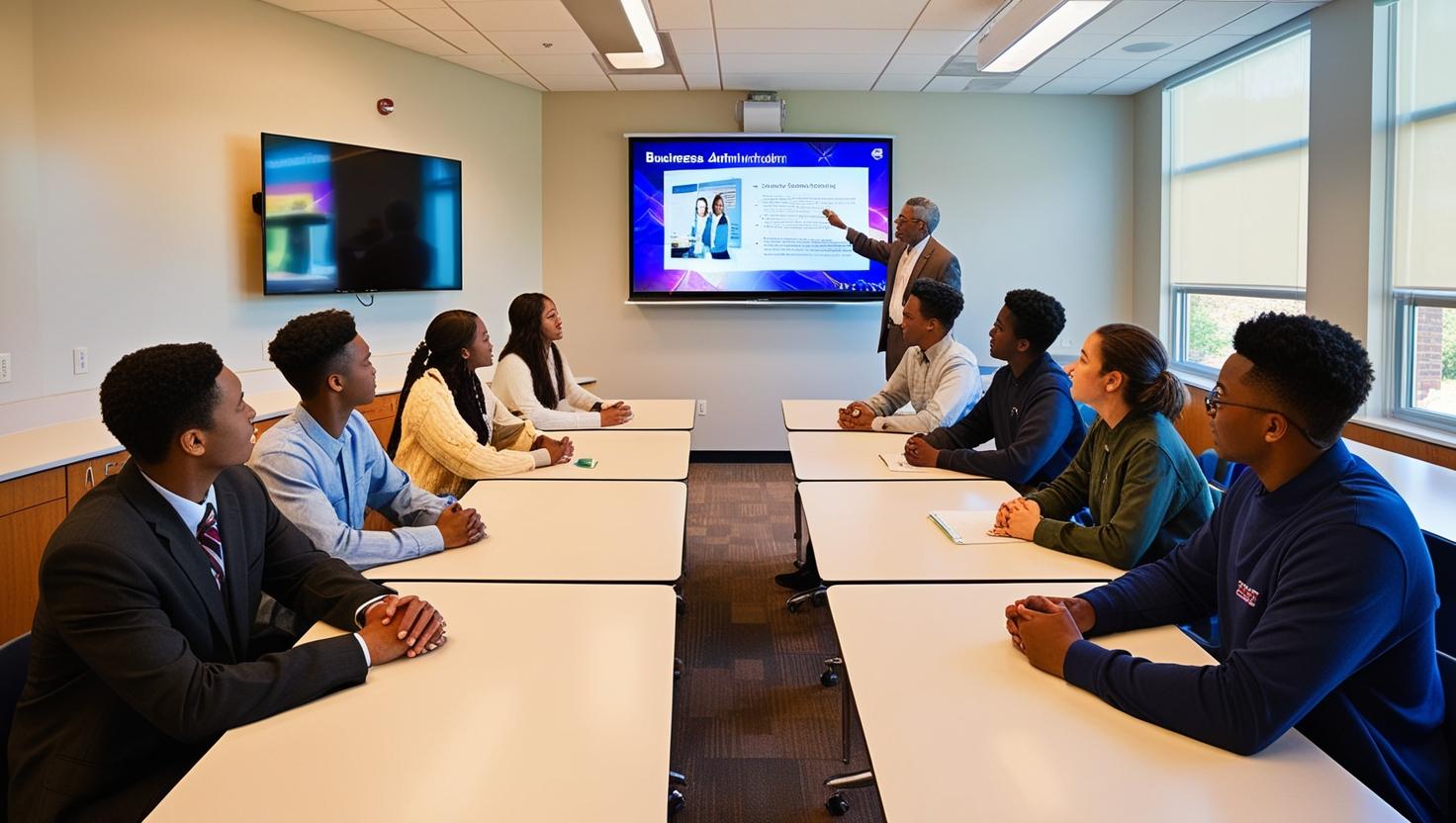Obtaining Your Bachelor's Degree at a Community College
In recent years, community colleges have been experimenting with bachelor's degree programs.
- With great success, many states are now encouraging community colleges to offer bachelor’s degree programs.
- The reason for this is they promote the acquisition of higher education for the greater public good.
- Community colleges also provide degree programs in an increasingly wide range of majors and subject areas.
Canva generated this picture of a community college class.

The Growing Trend
Baccalaureate degrees have traditionally only been earned through a university or four-year institution.
- However, things began to change in the 1990s.
- The Community College Baccalaureate Association (CCBA) sought to change this tradition.
It devised a mission statement that it intended to: "promote the development and acceptance of the community college baccalaureate degree as a means of addressing the national problems of student access, demand, and cost.” In support, TheAmerican Association of Community Colleges has also recognized the community college baccalaureate as, “an emerging development in higher education.”
The reason community college baccalaureate degrees have become so popular is threefold.
- Community colleges are able to respond to increased workforce needs more quickly than four-year institutions. For example, increased demand in recent years for qualified healthcare workers, such as nurses, has led to the explosive growth of bachelor's degree programs in nursing at the community college level.
- Community colleges have been able to respond to economic pressures facing students and communities because, on average, community colleges are far less expensive than four-year institutions.
- Community colleges have been increasing the accessibility of higher education by making degree programs more affordable and manageable than traditional universities. Many community colleges offer classes at night when the working public can come to campus for class. Additionally, community colleges were among the first institutions of higher learning to adopt online and distance learning methods, making their classes even more accessible.
As of 2024, community colleges in 24 states offer bachelor's degrees, with significant growth in states like California and Texas. In California, 32 of its 116 community colleges are approved to confer bachelor’s degrees, with three more colleges granted approval in March 2024. Texas has 21 community college districts offering these degrees. Nearly all community colleges in Delaware, Florida, Idaho, Nevada, and Washington confer bachelor's degrees, totaling 71 public community colleges. Other states like Arizona, Colorado, Ohio, and Wyoming also have a notable number of colleges approved for these programs.
This video describes the University of Mississippi Medical Center's partnership with Mississippi's 15 community and junior colleges in a statewide effort aimed at increasing the number of healthcare practitioners with baccalaureate degrees.
Responding to Workforce Needs
In responding to increased workforce needs, a growing number of potential employment opportunities now require a bachelor’s degree.
- This makes the job market more competitive than ever.
- In a recent study conducted by the federal government’s Bureau of Labor Statistics, the highest-paid careers in the nation all require at least a four-year degree. These high-paying professions include jobs such as airplane pilots, engineers, physician assistants, and many others.
The jobs with the most potential for growth through 2022 are listed as careers in the medical, mental health, and technology sectors.
- Since the job market now requires a four-year degree for most profitable careers, community colleges have quickly responded to this trend.
- They are working to make the baccalaureate degree more attainable for their students.
- Also, community colleges are simultaneously responding to the great pressure to provide students with programs that can ensure employment in fields of great need upon graduation.
The job market is evolving, with a growing emphasis on skills over traditional degrees.
- Many high-paying careers, such as web development, data analysis, and skilled trades, prioritize practical experience and certifications over formal education.
- However, bachelor's degrees remain crucial for many fields, especially those requiring advanced technical skills or professional certifications.
- Community colleges offering bachelor's degrees are responding to workforce needs by providing accessible and affordable pathways to these careers.
This video describes Edmonds Community College's classes, degrees, and certificates, which prepare students for in-demand careers.
Responding to Economic Pressures
Most universities that offer bachelor’s degrees are expensive.
- Not only are tuition expenses costly, but expenses such as room, board, fees, supplies, etc., make a four-year institution a costly proposition. Added up, traditional baccalaureate programs can become economically inaccessible for many students rather quickly.
- Since many students struggle to afford university costs, some students complete their prerequisite studies at a community college.
- Then, they transfer to a four-year institution.
As the California legislature explains, “In some, but not all, geographic regions, baccalaureate degree programs are being delivered successfully at the local community college through agreements between the community college and four-year postsecondary institutions within or outside of the state.”
To respond to this economic and social trend of transferring credits and sharing programs, states are now allowing community colleges to issue bachelor’s degrees.
- The reason for doing so is that further expands “access to baccalaureate degree programs through the use of community colleges,” according to the California Performance Review.
- Ultimately, instead of forcing students to juggle costs of transferring, students can now complete programs at their initial college, making the whole undergraduate experience both more affordable and convenient.
Since community colleges are growing in popularity, some states, such as California, provide a reduction in enrollment fees at various community colleges.
“More students find receiving a community college education more accessible and affordable, which leads to increased enrollment,” according to the Lompoc Record.
Many students realized that with the reduction of fees and costs at a community college, compared to a university, a student could take more courses at one time, instead of having to spread out a program to balance the costs of tuition and expenses. As a result, the lower cost, “allows students to take more classes which in turn speeds up the whole college experience,” as explained by the Lompoc Record.
Instead of graduating in four years, for example, a student might only need three to three-and-a-half years to complete a bachelor’s degree.
Increasing the Accessibility of Four-Year Degrees
As more states are granting community colleges the authority to incorporate baccalaureate programs in their academic offerings, many state legislators are speaking out about the social benefits of such great shifts.
In 2001, the Florida legislature granted a public community college, St. Petersburg, the authority to issue bachelor’s degrees.
“The Legislature intends to create an innovative means to increase access to baccalaureate degree level education in populous counties that are underserved by public baccalaureate degree-granting institutions.”
The state legislator argued that community members should have equal access to baccalaureate degrees, as this would provide more job opportunities, addressing the inaccessibility of traditional four-year programs.
This argument is applicable to rural states, such as North Dakota, as well. With a high need for workers in the energy industry and not many four-year colleges in the state, the North Dakota legislature granted Bismark State College the authority to confer a bachelor’s degree in energy management, a degree that can be obtained completely online.
In addition, since many traditional universities are not only inaccessible for some community members, but also require relocation, community colleges are offering a more convenient and local approach to the earning of a baccalaureate degree.
Essentially, according to the California Performance Review, “Establishing new and creative bachelor degree programs at community colleges is a strategy to increase college participation rates for local residents who are unable to relocate because of family or work commitments.”
Ultimately, making baccalaureate degrees more affordable, while diminishing the drastic requirements of relocation, baccalaureate programs are growing in popularity.
As evidenced by the popularity of the online energy management program in North Dakota, online coursework is a popular option for many students pursuing bachelor’s degrees at the community college level.
The number of community college baccalaureate (CCB) programs has increased significantly, with a 17% rise from 583 to 678 programs over a two-year period.
- These programs are designed to meet workforce demands, particularly in fields like healthcare and technology. Approximately half of all CCB programs award traditional Bachelor of Science (BS), Bachelor of Science in Nursing (BSN), or Bachelor of Arts (BA) degrees.
- The growth in program availability reflects the increasing recognition of community colleges as viable institutions for obtaining a bachelor's degree.
This video reports on how Front Range Community College received approval for a four-year Bachelor of Science in Nursing (BSN) degree.
Conclusion
In conclusion, community colleges offering bachelor's degrees represent a significant shift in higher education, providing students with affordable and accessible pathways to career advancement. As these programs continue to grow and adapt to workforce demands, they are poised to play an increasingly vital role in shaping the future of education.
Questions? Contact us on Facebook, Instagram, and YouTube. @communitycollegereview
#CommunityCollege #BachelorsDegree #HigherEducation #AffordableEducation #CareerDevelopment












